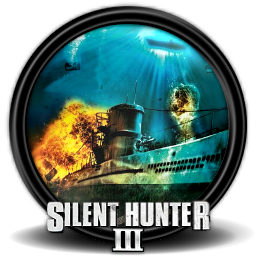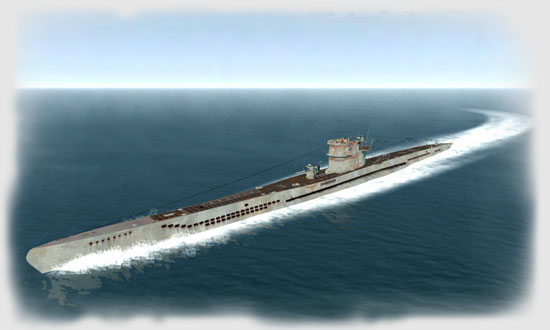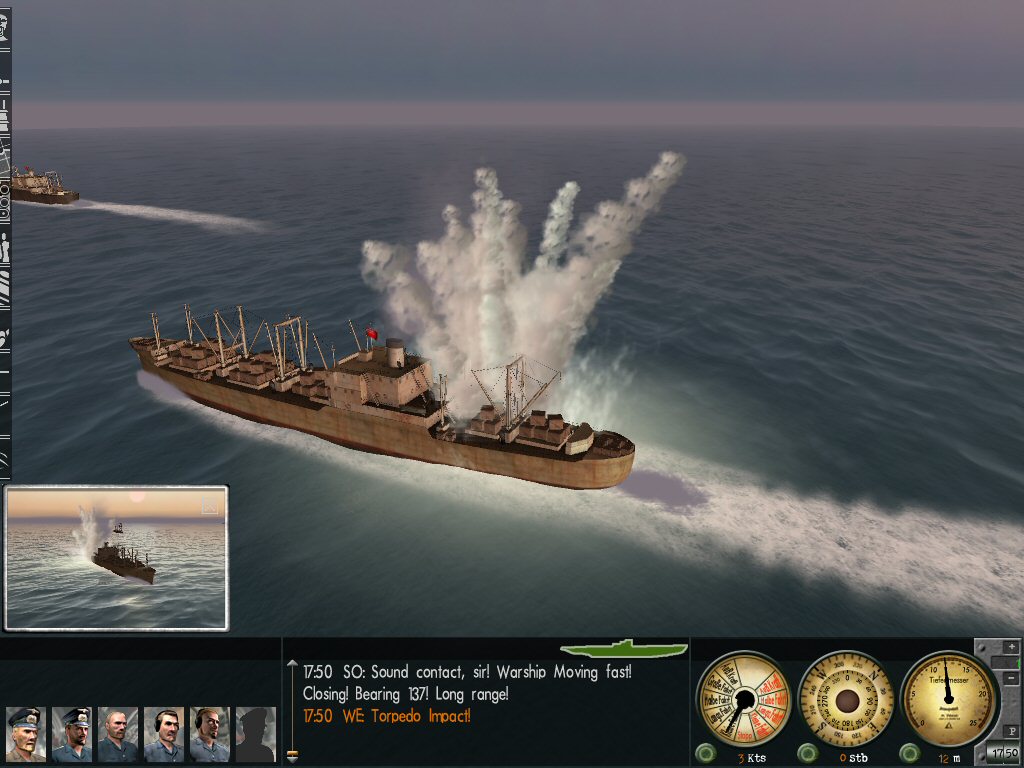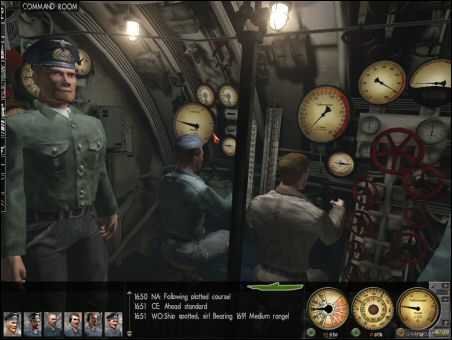 …. I’m hunting merchant ships.
…. I’m hunting merchant ships.
So, having mulled this game over for a long time, I finally bought it. Yes, yes, I know there are some shiny and sparkly new games out there. And I could have put my money to them if I wanted to, and may still. Silent Hunter III is an older game now, the latest in the series being number 5, so it is not current news and I would say that every review that could be written has been written. However, if you are like me and you have not even read those reviews anyway, then this will be a good journey together to the bottom of the sea.
Why did I buy it? Well, because I felt like stretching my horizons when it comes to games, and there are few out there that play like this one, while much of the rest out currently play like everything that came before it.
Silent Hunter III is an offering from Ubisoft, developers of other wartime simulation like games such as Lock On: Modern Air Combat. Both games have a little in common despite warfare as they are, at their heart, simulation games with an attention to realism. Other games by Unisoft are Blazing Angels, another wartime sim, Ghost Recon games and the ever popular Splinter Cell. Though I guess these games come from a different branch inside of Ubisoft’s development house.

In Silent Hunter 3 you are a WWII German U-Boat commander tasked with missions in your career to head out and either find a specific ship or to just patrol somewhere for a while. The final word from the game is realism and it does deliver with very few (though they are there, still) compromises to playability. Time passes as real time, though there is an option to speed up, and I dare you not to use it. If so you are dedicated to your cause of realistic gameplay. And most likely you are used to the likes of flight sims and enjoy making regular round trips of 8 hours and back without a break. After completing the naval testing sections, which I do advise you to do first time round despite the length of time they take, I loaded up an actual career and got started. There are also pre-set mission with objectives and starting conditions as well, for fast insertion into a scenario in the war, but they speak for themselves and I will not be reviewing those.
Before you begin your mission there is the usual process of creating a profile, which you need to do to do any training as well, since it enters into your career history and affects your starting ‘renown’ points which I will talk about soon. You then get round to picking your starting year and your flotilla which will affect the state of things on the sea in terms of targets and starting location based on Germany’s operational bases at the time. And the flotilla you pick will also change the tech tree you have access to and what your starting sub will be. Going to the first year available, 1939, you have the 1st and 7th to pick from. The 1st being lumbered with the ageing type IIA but a prime location at a base with quick access to the North Sea. The 7th have the Type VII from the start, which is a little faster, has more crew and carries more torpedoes and can also fit a deck artillery gun. After a couple of patrols, having done the training in a type VII, I was starting to regret my decision to pick the 1st flotilla and their charming old buckets. Having only 5 torpedoes left little room for error which a couple of patrols brought home for me. However, the 1st do get access to the type VII eventually near the end of 1939 which you can requisition with your renown points. And if all else fails you can transfer anyway, or at least request it. I have not done this yet as I am starting to get attached to the 1st and seem myself already as a true 1st flotilla guy. So I was going to work for my prize.

Anyway, the first mission in your career starts you at the docks with a cheering crowd and a fanfare as you give the orders to pull away, plot the courses to navigate the docks and begin making your way to the North Sea where you have been given a grid reference to patrol. It seems the more patrols I have done the more this looks like the standard format. At time of writing I am already on patrol 7 and each time nothing special has been presented to me so there is likely little in way of emerging story except for the changes of scenery and focus areas of patrols. They are also random as I tested it by restarting the career a couple of times and each time the patrol grid was different. However, my first patrol underway I started looking for the grid and…. wait…. it is off the north tip of Norway? Hell…. plotting a course of over 1300km on the chart for the crew brings a journey time of around 92 hours. Real hours.
So yeah, feel free to ignore the time-lapse feature if you wish. Some of us have real lives to attend to after all.

Since simulation is the theme of the game, the arcade like controls are out the window. You control the sub by means of setting values on dials for speed and depth, or you can set a rudder offset to hold, or plot a course on the map, and so on. But you do not control the sub directly with a control pad and a front seat view. Actually I hope you like dials and pipes because that is generally the standard view of the cabin wherever you look, from the eyes of the sub’s captain, except for the ‘free view’ camera which is more for cinematic effect and capturing good screenshots. Don’t worry, though, you won’t have to go running around turning dials. You have a crew who you can issue your orders to via controls on the UI and some hotkeys. This is not exactly a concession to playability as a real commander would speak and have others do things for them anyway, and the UI is simply a visual interpretation of speaking. Set the speed by clicking the engine setting you want on the dial on your UI, or the assigned hotkey. Set the heading by clicking a location on the compass, or steer the sub via commands on rudder position instead, also represented as a dial on the UI. You can also look at a map and place a waypoint and the navigator will use this when you tell him to follow that course. And all these dials are mirrored live all over the sub on the model itself, which is a nice touch, even the map on the table shows what is happening.
There is even a small grace time from issuing an order to the order being executed, so using the rudder controls to fine tune your direction, like keeping the bow pointed to your target for easier torpedo solution calculation, or evasive manoeuvres from incoming fire and bombs from the sky, have a delay from command to anything happening. This is a very nice touch and further removes you from classic arcade controls.
As for combat, it is not entirely a case of point and click. The torpedoes need calculations as they are not homing missiles and do not lock on the target, at least not early in the war and even then they still need launch patterns to get them going in the right direction. You have to tell them the speed, the distance to detonation, the initial turn they have to make to get on course, a finer tune turn after that, the depth and so on. All based on what you see on your charts and through the scope. Of course, again, you have crew so your Weapons Officer can do the work for you if you identify the target for him. He will work out the rest provided you have the periscope set where you want it.Don’t waste time giving the launch order either. A plotted torpedo shot will become useless in seconds as your sub and target are always moving.
Also, a little seamanship and naval tactics comes into it for getting yourself into a good firing position. If you fire at an odd angle your torpedo could skip off as the firing pin does not make contact, and you wasted a precious torpedo. Or you could chance a magnetic detonation under the keel of your ship by setting the depth a little lower and telling the firing pistol to use the magnetic sensor but this is not entirely sure as an impact even if it delivers the best damage. Still, your ammo is very limited, especially in the first sub as I mentioned earlier. There is also surface combat as some subs have a deck gun you can give orders to, and a flack gun for shooting down aircraft if needed. And yes, you can man these guns yourself if you wish.
You have to manage the crew by putting them in the sections of the ship as needed and moving them to quarters when they get tired. More in the engine room when cruising, damage control when in combat etc. And again, there are presets you can use to quickly shift. So you don’t have to entirely micromanage them. However you cannot create your own presets, which I find annoying since when I am on the surface the default preset empties the engine rooms and there is no officer of the watch on the bridge outside. And for some reason, in the campaign I started, the first time I submerged after leaving dock I set the preset to cruising and the engine room was empty and the engines stopped… this is not cruising. This is, well, un-cruising. So these options are kind of dumb and I would rather not use them. I have a good system working now to keep moving them to a minimum and keeping an eye on shift patterns while keeping some in reserve and refreshed for optional surface bridge duty or a stint in the torpedo rooms when I am in combat.
Even then, transition from surface to underwater and back again does odd things and moves crew between engine rooms or fills the bridge taking crew from engine rooms etc and if left unattended it would screw with the system I have working. In short, letting the AI have its way with the crew is a bad idea. However the need to manage the crew makes me feel like I am rotating cheap rechargeable batteries between my remote control and the wall charger, since the crew burn out within an hour. At first I felt this made the timelapse a bad sell since an hour can pass in 10 seconds making it pointless to use if I have to stop and move crew around again and again. However a test of this showed I had nothing to worry about as the crew fatigue only in real time, not in game time. This can become a double edge sword though when using timelapse to move between comabt because they also only refresh in real time and you will spend a good 20-30 mins in real time when in combat, keeping a finer eye on things. So since you will have more crew at their stations they are likely to tire faster and all at once. I am not trying to sell this as a downside either because the more I think about it the more it feels like a good game balance and some thought has been put into it to make it not entirely too easy while keeping the game playable for the short of patience.
Also your crew can learn skills that make them better at their job so there is a small RPG like element to it. I can have my warrant officers skill in radio operation, torpedo systems and engineering to make them more specialised at the jobs in the sub and improve sub performance, and the better their areas run the slower a crew assigned there will tire out.
There is one small issue with the resting system. I notice that they seem to lose their energy at odd rates. The most senior officers in the command room lose energy very slowly, as do the other crew in the slots provided for them. Assuming it has something to do with the efficiency of that section of the ship since it seems to be always at full green. And I notice crew burn out faster when the section is on low efficiency. This all makes some sense to me, but I notice that warrant officers seem to degrade quicker from full stamina than the seamen in the same sections, and they seem to take longer to recover from the same state of fatigue than the seamen. And while the senior officers do last longer they take the longest of all to recover.
As I sailed along north I wondered what the seas would be like and I am delighted to report the weather was damned awful. The seas were heaving, the sky was grey with cloud and flashes of thunder arced overhead. Even the crew I sent outside would be wearing wet weather gear while on watch. However I did also notice that the day-night cycles were a little off. I found it odd on the first full day that the sun, that set at a sensible time of about 8pm (and the time of year was September so it sounds about right) the sun did not rise until about 11am. I don’t remember it being that dark in September, or ever actually. And at that time I was at about the latitude of my own home. I would have expected a sun rise at about 7:30ish, really, and by 3am the sun was still rising… I did wonder if the clock was set to something like Zulu time (GMT) and if my position in the world made a difference but then realised it would only make sense if I were in the mid-Atlantic, and I was in the North Sea so really I should have seen the sun rise a little earlier than the clock suggested. On other missions this seemed not to be a problem though so I think this is a bug as actual daylight hours seemed realistic enough, just not in synch with the world time.
Still, the scenic effects are good and the ocean waves are modelled very well, as is the colour of the sky as the day goes on. Seagulls float near shores and follow the sub on the surface, the ships break apart nicely and seemingly random. I have not seen one standard template destruction of a ship so far, something I did not realise until the 14th ship I sunk as I watched it slowly lose height on the side of impact, still not registering as a kill yet, and took around 2 mins of me watching thinking I should put another torpedo in the side as it rolled to port and went down whole and sideways, finally giving me a kill message in my log.
The dangers of the sea are pretty fun as well, with enemy warships patrolling and fighter bombers making passes at me from overhead. Once I got sloppy and suddenly there were 6 of them in a long row heading my way, each dropping a bomb in my wake getting closer each time. The rough seas I experienced on my 3rd patrol, which robbed me of a kill or two by thwarting my torpedoes, also started to damage my sub by pushing me down in the shallows round the coast and my hull was bumping the seabed. So, again, hallmarks of simulation realism.
As I have mentioned above, there is also a ‘renown’ system which I guess in other games you would call reward points. This is the game’s currency where you, as the captain of the sub, can purchase upgrades and weapons. Subs can have new conning towers and deck guns, battery upgrades, engine supercharging, new hydrophones and even an entire new sub. They are also used to purchase extra crew when needed to replace dead ones or crew with new specialisms you might need. Often they are free anyway if you go for the low rank and inexperienced available in the pool, though officers and crew with higher ranks and training will come at a price. The only issues I have with the renown system is that the manual supplied does not really give you information about how you earn it. It is clear you get it on patrol, but each time it has been more or less than before and I am not clear if it relates to tonnage sunk, time spent out on patrol, condition of the sub and crew, enemy military units destroyed or a factor of any or all of the above. I assume it is something like the latter added onto a basic renown allowance given for a patrol completion.
Another annoyance with the game is the way it handles saves and player profiles. This has cost me career progress twice. In the interest of testing, after my 3rd patrol, I went back to look over the menu options for starting a career again, using my same player profile, to see what else there was available with the 7th fleet and if you get a type VII sub as standard. (You do) Then I went back to reload my save for the previous career and it was all gone. I have never seen this before in a game with player profiles as they usually keep the save games regardless of starting fresh or not.
Another issue was when on my second attempt at a career my sub rammed the walls in the port for some odd reason I have not determined, and was damaged before I got started so I quit the patrol and started a new one, but regretted it and went back to the start of that patrol again. But before I loaded it I deleted the saves in front of it and decided I wanted to delete the previous save points as well. When I deleted the first save point before patrol 1 the entire list of saves after it also deleted. So, I had to start a third time. Still, in all this blundering I did find out that the patrol grids you are assigned are random.
So, yeah, the game has a few little odd glitches but overall not as many as a lot of other games you might play from other big game developers. The essence of the game is simulation so if you are into that level of realism then knock yourself out, though be glad to hear that the game accommodates people who are not hardcore simmers as well so even they can enjoy it. Still the action is slow even when you speed up time to an encounter. As for execution of the game I would say they have done it very well.